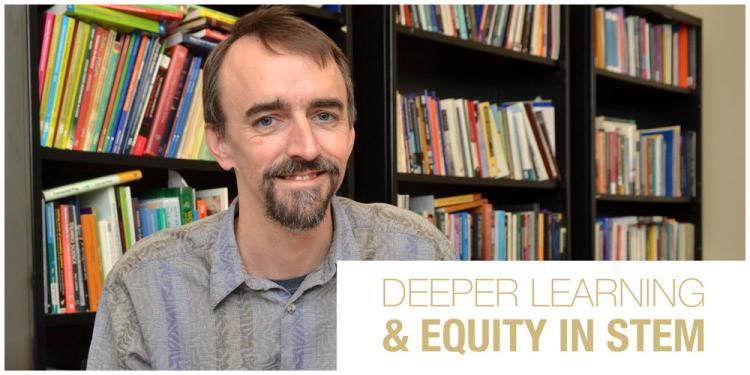In an effort to promote equity in mathematics and science education, two foundations have awarded funding to the University of Colorado Boulder and its partners to enhance research in deeper learning among students.

CU Boulder School of Education Professor Bill Penuel
“We need to promote equity through deeper learning so that students can see how subjects like science and engineering can connect to their everyday lives and be useful to imagining more than just futures for their communities,” said CU Boulder School of Education Professor Bill Penuel, the principal investigator in both grants.
The two new grants support the work from the Inquiry Hub research-practice partnership (RPP) between CU and Denver Public Schools (DPS). CU Boulder and DPS have been partners since 2007.
Deepening Equitable Learning through Culturally Relevant, Phenomenon-Based Science Teaching
The William & Flora Hewlett Foundation $1 million grant supports the Inquiry Hub’s work in encouraging deeper learning in students by giving support to teachers to engage in culturally relevant, phenomenon-based science teaching. Northwestern University, the Tidemark Institute and now Project VOYCE have joined as partners in this project.
“We’re especially excited to have Project VOYCE to bring a student perspective on the classroom to us,” said Penuel. Project VOYCE works on developing leaders in underrepresented communities through training, employing, and organizing youth to address the root causes of inequity.
The overarching goal of the project is to have 80% of secondary schools in DPS have at least one teacher who cultivates an inclusive classroom culture in which student achievement cannot be predicted by race or gender.
The co-principal investigators in this project include CU School of Education Research Assistant Professor Katie Van Horne, DPS Director of Science, Social Studies and World Languages Susan Olezene, Northwestern University Professor of Learning Sciences Brian J. Reiser, President of Tidemark Institute Jean Moon, and Executive Director of Project VOYCE Candi CdeBaca.
Building Capacity for Using Data on Student Experience as Formative Assessment to Promote Equitable Instruction
The Spencer Foundation grant of $399,960 supports the Inquiry Hub’s work in improving curriculum coherence and creating tools in which teachers can measure their success.
Curriculum coherence focuses on a student’s ability to understand what they are doing and why it is meaningful. Instead of doing an activity “because the teacher told us so,” students are able to explain how the knowledge they are learning connects with the overall arc of the topic.
This grant furthers the Inquiry Hub’s work in expanding efforts to develop, implement, and test new student-centered, project-based curricula.
In science curricula, student-centered means that teachers have to “trust students’ powers of observing the world around them,” said Penuel. “Curiosity can generate questions that they can pursue on their own and in class.”
The grant also supports the development of tools that teachers can use to see how students are doing in terms of curriculum coherence.
“Improvement really depends not just on making shifts to teaching but checking to make sure - from the student perspective - that classrooms are more inclusive places where knowledge building engages everyone in doing meaningful science” said Penuel.
The co-principal investigators in this project include CU Boulder Director of the Institute of Cognitive Science Tamara Sumner and DPS Science Curriculum Coordinator Douglas Watkins.
